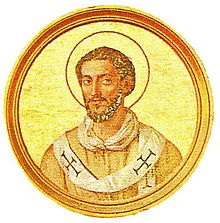Pope Caius
|
Pope Saint Caius |
|
|---|---|
 |
|
| Papacy began | 17 December 283 |
| Papacy ended | 22 April 296 |
| Predecessor | Eutychian |
| Successor | Marcellinus |
| Personal details | |
| Birth name | Caius or Gaius |
| Born | Unknown Roman Dalmatia- Today Albania |
| Died | 22 April 296 Rome, Western Roman Empire |
| Sainthood | |
| Feast day | 22 April |
Pope Caius (died 22 April 296), also called Gaius, was the Bishop of Rome from 17 December 283 to his death in 296. Christian tradition makes him a native of the Dalmatian city of Salona, today Solin near Split, the son of a man also named Caius, and a member of a noble family related to the Emperor Diocletian. He was Illyrian.
Little information on Caius is available except that given by the Liber Pontificalis, which relies on a legendary account of the martyrdom of St. Susanna for its information. According to legend, Caius baptized the men and women who had been converted by Saint Tiburtius (who is venerated with St. Susanna) and Saint Castulus. His legend states that Caius took refuge in the catacombs of Rome and died a martyr.
About 280, an early Christian house of worship was established on the site of Santa Susanna, which, like many of the earliest Christian meeting places, was in a house (domus ecclesiae). The domus belonged, according to the sixth-century , to brothers named Caius and Gabinus, prominent Christians. Caius may be this Pope, or Caius the Presbyter. Gabinus is the name given to the father of Saint Susanna. Thus, sources state that Caius was the uncle of Saint Susanna.
As pope, he decreed that before someone could assume the position of bishop, he must first be porter, lector, exorcist, acolyte, subdeacon, deacon, and priest. He also divided the districts of Rome among the deacons. During his pontificate, anti-Christian measures increased, although new churches were built and cemeteries were expanded. St Caius may not have been martyred: Diocletian’s persecution of Christians began in 303 AD, after Caius’ alleged death, and Diocletian was not immediately hostile to Christianity upon becoming emperor.
...
Wikipedia
